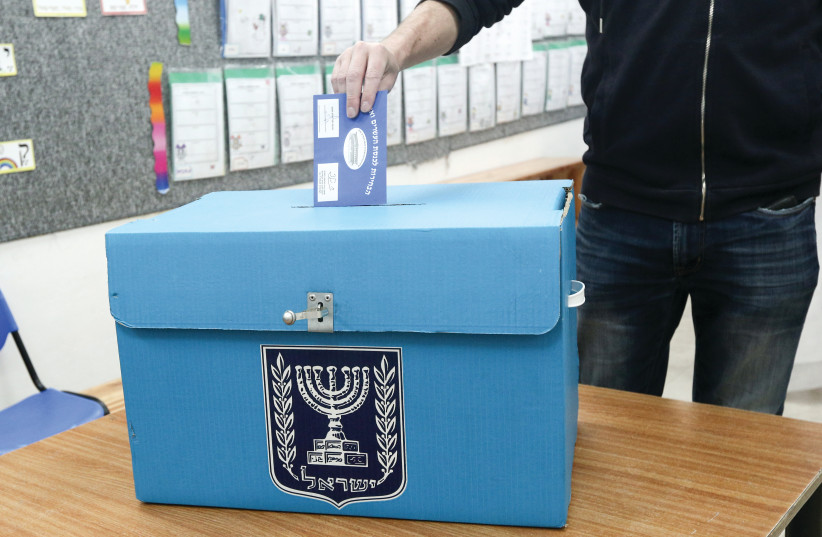As the country heads back to the polls on Tuesday for the fifth time in less than four years, there is a great deal of uncertainty about the results and their long-term ramifications. Only one thing is known for certain: The morning after – whatever the outcome, whoever ends up leading the next government, whatever parties end up sitting around the cabinet table – Israeli citizens will have to continue living together. What’s more, we have to find a way to keep Israel the success story it is – on the one hand, the one Jewish state, and on the other, a vibrant democracy with rights for all citizens.
There are too many issues of strategic importance on the agenda for the party leaders not to find some common ground. From the security situation, the threat from Iran, economic challenges, social-economic gaps, the health system, environmental concerns, and even down-to-road safety – all these issues affect every one of us and need to be dealt with.
MKs from different parties and opposing sides need to find a way to work together in a responsible and functioning coalition and as the opposition.
More importantly, each member of the public can choose individually how to respond to the election result, whether it is what they want or not. Each individual can determine the tone and rhetoric they use.
There is a tendency toward knee-jerk responses. People react automatically according to the camp or sector to which they belong.

This is not healthy.
Obviously, in an age of social media, differences are magnified. Rifts grow wider and deeper as people stick to their own “echo chambers.” The platforms that profess to be a means of bringing people together, too often have become divisive and even vicious. Altogether, there is a tendency to see everything in terms of black and white, Left and Right, true and fake news. There is less tolerance. A pervasive attitude seems to say, if you’re not one of us, you’re with the enemy.
Sometimes the deliberate divisiveness of political leaders is a major reason for the splits, and sometimes it is the hysterical reaction of political opponents.
As Lilac Sigan wrote in an opinion piece in Maariv ahead of elections in 2019, “When you insist on sticking to Left-Right labels, which have become distorted over the years, you discover that it’s not principles that are leading the argument but the rivalry. The main thing is to prove that the other side is wrong, even at the price of a string of claims that completely contradict themselves.”
“When you insist on sticking to Left-Right labels, which have become distorted over the years, you discover that it’s not principles that are leading the argument but the rivalry. The main thing is to prove that the other side is wrong, even at the price of a string of claims that completely contradict themselves.”
Lilac Sigan
More recently, she wisely suggested that the time had come to ask politicians not with whom they would or would not sit, but what they were going to do to create a new formula and long-term solution to the political mess.
Knesset Defense and Foreign Affairs Committee chairman and Yesh Atid MK Ram Ben Barak, for example, said in an interview at a Shabbat cultural event in Beersheba, “I am not comparing this to anything – I am saying that in advance in order not to be quoted – but Hitler came to power democratically, he was elected in a democratic way, and one of the first laws he enacted, if not the first, was to cancel the [German] High Court, and then he brought all of the other laws and made Germany what it was.”
“I am not comparing this to anything – I am saying that in advance in order not to be quoted – but Hitler came to power democratically, he was elected in a democratic way, and one of the first laws he enacted, if not the first, was to cancel the [German] High Court, and then he brought all of the other laws and made Germany what it was.”
Ram Ben Barak
But Ben Barak knew he would be quoted. He knew what he was comparing. And he knew exactly how his warning of the dire consequences that he sees in the possible election of Otzma Yehudit leader Itamar Ben-Gvir and Religious Zionist Party head Bezalel Smotrich together with Likud and opposition leader Benjamin Netanyahu would be interpreted, both at home and abroad.
The problem, of course, is not limited to Israel, but that is no consolation. In fact, it should be a warning. Israel’s strength – its famous resilience – depends on its solidarity. Israelis famously come together during disasters and wars. It is time to make sure that now, more than ever, we keep that sense of solidarity in good times too. In fact, it’s vital to maintaining the good times.
We are all in the same boat whether we like each other or not. No matter who is at the helm, we need to ensure we can move ahead together.
